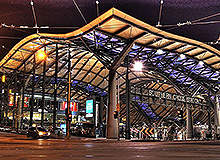
In August, China and Malaysia broke ground on a $13bn rail project, the 688km East Coast Rail Link (ECLR) that will link Malaysia’s east and west coasts, as well as the peninsula’s main shipping ports.
The ECLR is hoped to unlock the business and trade potential of formerly underserved large regions east of the country, which currently have inadequate transportation networks. It will also connect the South China Sea to the Straits of Malacca, potentially altering key international trade routes in the process.

Discover B2B Marketing That Performs
Combine business intelligence and editorial excellence to reach engaged professionals across 36 leading media platforms.
The project was called a “game changer and a mindset changer” by Malaysia’s Prime Minister Datuk Seri Najib Tun Razak.
“The ECRL project also sets the tone for an economic spin-off effect and positive social impact for the east coast states,” Razak said during the ground-breaking ceremony at KotaSas Central Station. “It will be a catalyst for economic equality between the west and east coast as it will stimulate investment, spur commercial activities, create ample jobs, facilitate quality education and boost tourism in Pahang, Terengganu and Kelantan.”
Malaysia is not the only nation that will reap the benefits. The corridor is set to become another key piece of the One Belt, One Road puzzle; China’s ambition to revive the old Silk Road trade route, connecting South East Asia, Pakistan and Central Asia by land, and further Middle East and Europe by maritime routes.
A new connection for a growing economy
Malaysia heavily relies on its rail network as the backbone for both passenger and freight transport. Rail ridership is on the rise throughout the country, with a grow of 8.5% in usage between 2011 and 2015, according to statistics from the Land Public Transport Commission (SPAD), the country’s transport commission. The annual ridership for rail throughout Malaysia stood at 230 million in 2014.

US Tariffs are shifting - will you react or anticipate?
Don’t let policy changes catch you off guard. Stay proactive with real-time data and expert analysis.
By GlobalDataThe East Coast Economic Region is of particular importance for the country’s continual development and growth. Covering 51% of the total area of Peninsular Malaysia, it houses nearly five million people.
ECLR was thus identified as a “high impact infrastructure project that will form the backbone of [the regions’] multimodal transport infrastructure” by the government.
Trains will run across 688km, from Tumpat in Kelantan to Port Klang in Selangor, with a journey of about four hours.
It is estimated it will service around 5.4 million passengers and carry 53 million tonnes of cargo annually by 2030, as well as creating 80,000 jobs and increasing the gross domestic product of east coast states – Kelantan, Terengganu and Pahang – by 1.5%.
“The revenue from the operation of the ECRL is projected to be obtained through a transportation ratio of 30% passengers and 70% freight,” Razak said.
The $13bn railway project is funded in a proportion of 85% by China’s Exim Bank, via a soft loan at 3.25% interest, with the remaining 15% covered through Islamic bonds by Malaysian investment banks.
State-owned China Communications Construction Company will build the network in two phases; the first one will cover the stretch between Kota Bharu and ITT Gombak, while phase two will complete the route to Pengkalan Kubor. The PM stressed that in the agreement, he secured a deal under which at least 30% of Malaysian contractors are to be involved in the project.
Is China using ECLR as a political pawn in the area?
For many, the project, heavily funded and promoted by China, is a sign of the Chinese state’s increased influence over its South East Asian neighbours, as well as an economic and political instrument to win stronger diplomatic allies and have free access to those newly growing markets.
Empirical evidence shows that China’s pursuit of high-speed rail dominance – whether at home or as an export product – transcends just transportation and convenience, and goes further, into the realm of political influence and economic ties.
For example, the ECLR contract was awarded to China automatically, without an open call for international bidders and it is just one of many Chinese investments in Malaysia over the past two years.
Research from the Institute of Southeast Asian Studies (Yusof Ishak) found that 14 MOUs and agreements valued at $34bn were signed in Beijing during Razak’s visit to China.
“China’s role in this project is not as investor, but more as contractor and financier which translates the project itself into an export of services from China to Malaysia more than anything else,” the report states.
It also highlights some of the risks. One the one hand, if the project, which costs close to 8% of Malaysia’s current public debt, fails to generate the expected level of demand and return on investment, it can put the government under a huge amount of debt to China.
This is also a risk on China, who has also thrown its weight behind other, similarly costly rail projects abroad – if these countries fail to pay it back, it can impact its strong economy.
“The China Government has attached great importance to the China-Malaysia relations and has always considered Malaysia a dear neighbour and trustworthy partner who is committed to seeking mutually beneficial cooperation and common development in the country,” Chinese state councillor Wang Yong said at the ground-breaking ceremony.
With increased trade and economic development coming out of the region, it is no wonder China is eager to beat the competition and form strong connections, both politically and physically, by delivering promising projects such as ECLR. Once a brand new rail route begins to serve a region formerly lacking in good connectivity, the rewards are likely to pile up fast – and China knows it will be there as a trusted partner to lock in on those deals.





